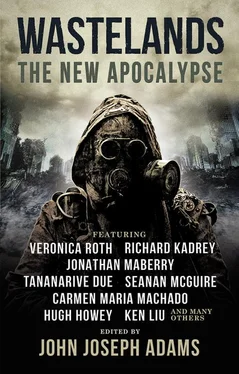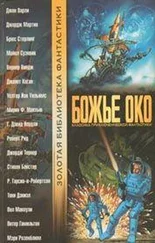“We know that,” said Peat.
The murdered man said, “I don’t mean millennia from now. I don’t mean centuries from now, or even any span of years. I mean weeks or months, no more. Listen: We’re sinking. Listen: We will soon be swallowed up. Listen: The sand will come in and fill the streets and blot out the sky and scour everything clean. Listen: Anybody who stays will die. Anybody who wants to live must leave.”
Kayn had already reached this conclusion just by walking around, but he had seen the dune sea: a desert that had long ago spread worldwide, without any fantastical oases or lands untouched by the entropy that had overtaken everything else. “There’s no place to go.”
The corpse could only repeat himself. “Anybody who wants to live must leave.”
“Shush, shush,” said Peat. She pressed a mirrored fingertip to the corpse’s lips, burning them slightly because of the generated heat she could do nothing to tamp. Being a corpse, he felt nothing but the intended comfort, and he grew calm long enough for her to speak the only ameliorating truth she could. “There’s no reason to worry. Nobody here wants to live, anyway.”
* * *
Later, Kayn said, “But I do want to live.”
By now they were wandering through one of the last remaining libraries with books made of paper. It was not, of course, real paper, made from trees: that would have deteriorated to dust long before. Paper had not been a thing since all information was trusted to the machines, and before that, since any texts human beings might still have some purpose for had been transferred to silicates. These books were designed to feel like paper, but were made of flexible alloys, chemically inert and designed to last forever. What a pity that some past vandal had seen fit to black out every line of type with a pigment just as eternal as the pages themselves, before re-shelving them in cases of the same material, as a means of ensuring that their splendid meaninglessness lasted forever!
He made his pronouncement while Peat was running her silvery hands over the pages of one volume grabbed at random, just to enjoy its texture. She looked up and said, “What?”
He repeated himself. “I do want to live.”
“But everything’s ending.”
“I don’t care. I haven’t done everything I wanted to do. I haven’t seen everything I wanted to see. I don’t want this story to be over. I want to keep adding to it. I want to live past the point where there’s any point in living.”
She was aghast. “Why?”
“I don’t know.”
“I’ve watched you. You’re as bored as I am. As bored as everyone is.”
“I can’t deny it.”
“Then why would you want this to go on?”
“I don’t know. I think it’s a birth defect of some kind.”
“There are no birth defects. The machines can fix any flaw there is.”
“I have one. I don’t seem to be able to give up.”
She said, “You implanted love for me. You can implant a death wish. It’s just as simple. There must be some machine still capable of doing that.”
“I tried that, years ago. Before the orgynism. I thought the time had come to end myself. I couldn’t make myself want to. I went to one of the machines and told it to adjust me, to make me content with the time I had lived, and ready to stop. It made noise for a while and then stopped. It was non-functional. Something about me had broken it. I tried another machine and then a third, with identical results. I broke down every machine I asked. When I realized it was impossible, I decided that blissful oblivion was just as good, and started recruiting lovers for my orgynism.” He thought about it for a while, as driven to silence by her nonplussed reaction as she was to what he said, and reported, “I don’t know. Maybe that’s why the orgynism rejected me. But I want to live. I’m stuck that way.”
She flipped through some more pages, caressing each one she stopped at, finding nothing new on any of them, but still finding mild distraction with the way they felt.
Then she said, “I don’t think I can love anyone so old-fashioned.”
* * *
They didn’t break up right away. Just as heat takes time to dissipate, so does affection, and so they spent the next few days having other shared adventures, some romantic and some not, as a means of continuing to spend the time that was now in such short supply.
They found a building on the edge of a neighborhood that had already been reclaimed by the sands, with one collapsed wing and one that seemed to remain upright only out of sheer stubbornness. It was an orphanage, long-abandoned, and the bottom floor was a nursery filled with babies. They were manufactured children, grown in vats and tended by servitors like all the world’s children had been, since long before this was the only city. Aged to what the peak age of what once would have been considered appealing, they were forever frozen at that level of maturity to be claimed by whatever adoptive parents happened to show up. There had of course been none for a long time, and thus every crib being tended had an occupant, squirming and cooing beneath inches of dust. There was no point in taking any of them, and so Kayn and Peat just spent an hour or so wandering among the bassinets, neither oohing nor aahing, but not immune to the pathos either. They named the cutest one, the one they would have taken had they been in the market, “Forever.” Forever regarded them with interest, imprinting. This, given their dearth of interest, was probably not a favor.
They found a machine in the shape of a pulsating sphincter attended by a tarnished servitor who explained that it was an art installation, designed to turn things into other things. Any object placed within the loading portal would be devoured and shat out the other side as another object entirely. Peat had seen such merriments before but Kayn had not, and so she stood by indulgently as he tested its capabilities with the various artifacts in range. He gave the orifice a stone plucked from the borders of a wilted garden, and watched as the orifice sucked it in, chewed, and produced an obscene statue of a woman having sexual congress with a tree. He gave it a little wooden table from an abandoned nearby café, and watched as the mastication produced a mound of broken glass. Then he ordered the servitor to feed itself to the orifice, and, being a machine, it obeyed without protest. The orifice chewed and the thing that came out the back was alive and boneless and incapable of any action but unending screams.
Peat said, “That was interesting.”
Kayn felt bad for the servitor, which had been polite and unoffending and didn’t deserve an end of this sort. Maybe feeding it to the orifice would produce an improvement? Perhaps, but it could also produce something much worse, and so he ended up doing nothing.
They sought out warmth, in the form of the city’s last furnace, a raging open conflagration that Kayn could not approach but that Peat was able to enter and explore, without harm. Her silvery flesh did not melt but grew red-hot, a transformation that rendered her so beautiful that Kayn might have fallen in love with her all over again, without artificial assistance. She spun and danced and sang, an ember that, for a few minutes, looked like she might have been able to devour all that remained of the city, all by herself. She seemed joyous. But once she left, she cooled rapidly, both in temperature and in mood, and she said, “That, on the other hand, was boring. I think I’ve decided to die now.”
“Are you sure? Maybe you’ll feel better in the morning.”
“Who wants to feel better? I’ve done that.”
Kayn could not dissuade her, and so they spent her last night in a ballroom that had become only a little shabbier over the centuries, dancing tangos and waltzes and pretending for a while to be a great lord and lady from one of those past eras that still had such things. At midnight an artificial moon rose on the other side of the cracked stained-glass windows, casting a beam of multicolored wonder through the dusty air. He kissed her for the first and only time, a moment of contact between his flesh and whatever her flesh happened to be that felt too much like kissing a thing made of ice. She said, “Goodbye,” disentangled herself from his arms, and strode to the center of the dance floor, raising one graceful arm and standing en pointe in a spot where her many shiny surfaces could reflect the moonbeam to every corner of the hall. It seemed like a moment of perfect stillness in the middle of a ballet. But as the long seconds passed, and she never came out of it, Kayn saw that she wasn’t going to. He approached her and touched a finger to her metallic cheek, finding a nub just below her right eye that might have been a metallic tear, and confirmed that whatever had made her Peat was gone.
Читать дальше


![Nick Cracknell - The Quiet Apocalypse [= Island Zero]](/books/28041/nick-cracknell-the-quiet-apocalypse-island-zero-thumb.webp)









